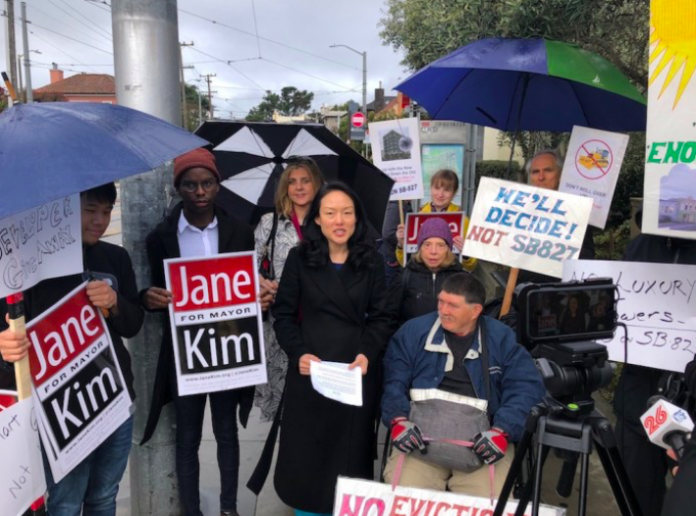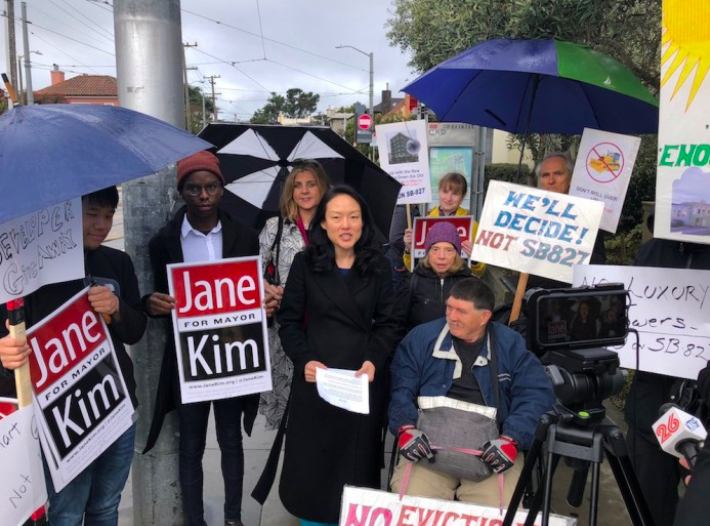
State Sen. Scott Wiener has introduced a new version of his housing bill that went down in flames last year, and while the current version, SB 50, includes more protection for renters, is still has the same basic flaws.
The new measure is still based on the same assumption: that the private market can and will eventually solve the state’s housing crisis – and that the problem is almost entirely on the supply side.

The law in essence would override local control of zoning and allow a lot more housing density – in cities that are already dense. It would allow at least five-story buildings – with no limits on density – anywhere within a quarter mile of a “high quality” transit line, which means a bus or train that comes at least once every 15 minutes during peak hours.
That, by the way, includes pretty much all of San Francisco.
If you add in state “density bonuses,” buildings could potentially add more stories.
This version seeks to address some of the concerns that sunk SB 827. It would prevent the demolition of any unit occupied by tenants any time in the past seven years. It would delay the implementation of the potentially huge influx of new development in vulnerable communities facing displacement pressures for five years.
But it remains a proposal that Yimby California is sponsoring, and while Yimby CA and Wiener talk about the need for “housing at all levels,” there is nothing in this measure to guarantee or encourage more than a small level of affordable housing.
The current draft of the bill states that new housing qualifying under the bill has to include a certain percentage of affordable units – but that specific number is not yet in the legislation. It will almost certainly be below 15 percent.
Help us save local journalism!
Every tax-deductible donation helps us grow to cover the issues that mean the most to our community. Become a 48 Hills Hero and support the only daily progressive news source in the Bay Area.
And while the measure protects against demolishing rental units, it has no such protections for commercial property or for owner-occupied single-family homes. The Yimbys have made no secret of their desire to get rid of single-family zoning in San Francisco.
One of the most obvious issues that the bill doesn’t address is transit. Wiener wants to concentrate growth along existing transit lines, which makes sense in theory – but in San Francisco, most of the “quality” Muni lines are already at capacity, and the city can’t hire enough drivers to keep the existing buses going, and building enough new capacity to handle the dramatic growth that Wiener and the Yimbys envision will cost billions of dollars.
Not one penny is allocated in the bill for upgrading existing transit or building new transit capacity to handle the new growth.
Supporters of growth often say that the tax dollars that come in from new housing and jobs will pay for those costs – but the data is clear: In San Francisco, growth does not pay for growth, particularly when it comes to Muni. So if, for example, the Sunset and Richmond are upzoned to allow for tens of thousands of new housing units (and I’m not against adding density on the West side), the city will be facing massive costs to upgrade Muni service – or else the quality of that service will decline rapidly. You can only fit so many people on a bus or light-rail train; I often see existing buses fail to stop and pick up more passengers because there’s no room on board.
I asked Wiener all these questions by email; he hasn’t responded.
Although the Yimbys say that homeowners are against density because it might hurt their property values, in much of the city, the opposite is true. Yeah, St. Francisco Wood homes would be worth less if that wasn’t a suburban-style development in a big city, but in most parts of town, upzoning is a huge financial benefit to existing property owners. A single-family house in the Sunset may be worth $1 million today; allow that house to be torn down and replaced with a six-story apartment building, and you can at least double that price for the land alone.
There is nothing in the Wiener bill to recapture any of that value for transit, affordable housing, police and fire, schools, or any other local needs.
There are areas where the Yimbys and people like me could agree. I don’t think that cities like Cupertino and Mountainview should be allowed to accept huge tech offices (and their taxes) without allowing any new housing at all. That just outsources the housing problem to San Francisco. But this bill pretty much exempts those suburbs – if you don’t have “quality transit” – limited to denser cities – you don’t have to accept more housing.
There’s another approach that Wiener could have taken – and that the state in general could take toward the housing crisis. Why do we allow unlimited office growth as if it’s always beneficial – when we clearly don’t have the housing, transit, road, or infrastructure capacity to handle the population and jobs that we have now?
Instead of deregulating housing – and that’s that this bill does – why not regulate office growth and enforce a link between new jobs (most of which, in San Francisco anyway, have gone to people who moved here to take those jobs) and housing, schools, and other basic public needs?
Why not tell developers that they can’t build office buildings and tell cities that they can’t approve new offices until they find a way (maybe by taxing the developers and corporations) to pay in advance for the housing those workers will need?
And who will pay for the housing for all of the people who work in service jobs created by that tech-worker influx?
The system that Wiener is promoting is radically unfair to the people who want to come to San Francisco to escape oppression where they are and to find an accepting community. It’s radically unfair to the people who want to come her to take a job. We are letting developers get rich and tens of thousands get displaced and tens of thousands more pay far too much rent because we refuse to admit that our finance and tax structure rewards development and starves infrastructure and affordable housing.
This really isn’t about density. It’s about understanding the economics of urban growth and development. Wiener’s bill assumes that the private market will solve all our problems – and when it comes to housing, that has never worked.

